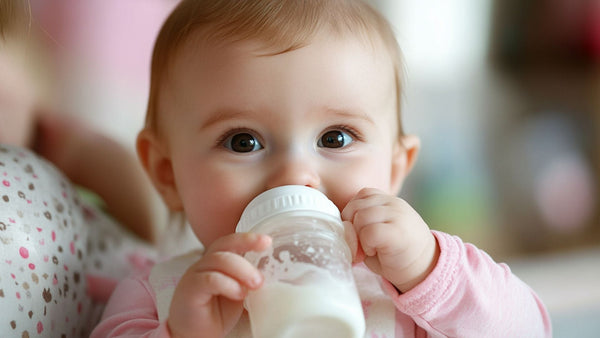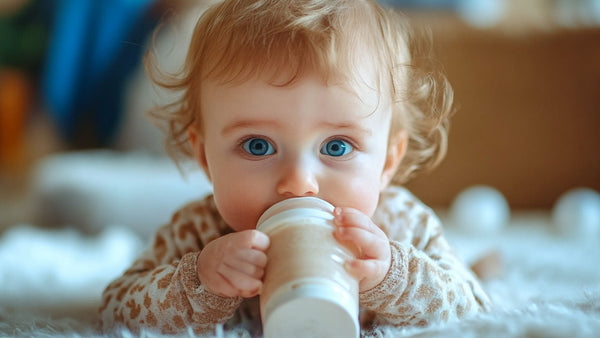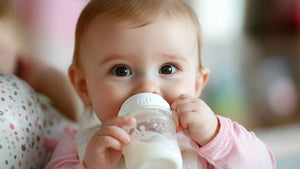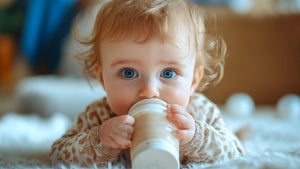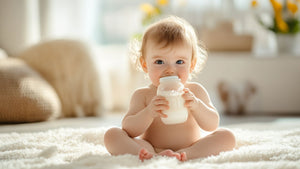How to Store Baby Formula in Hot Weather
Hot Weather and Baby Formula: How to Keep It Safe & Fresh
Baby food requires special care, especially during high temperatures. Baby formulas can spoil from excessive heat, particularly during travel. Baby formulas contain essential nutrients and elements for infants. Even moderate temperatures during prolonged exposure can affect formula quality. Liquid formula can lose its nutritional properties and become unsuitable for feeding. Liquid formula, when stored incorrectly without proper cooling, loses its consistency and safety.
It's equally important to protect dry formula from direct sunlight and heat exposure. Parents often wonder "Does powdered formula go bad in heat?" and the answer is yes. Dry formula can clump together and become unsuitable during extreme heat conditions. Dry formula loses beneficial components that are essential for babies. Harmful bacteria can multiply in formula due to improper storage and contamination. Parents need to understand optimal temperature ranges and proper storage methods. The best storage practices will help maintain formula safety for infant health.
How Heat Affects Baby Formula: What You Need to Know
Both heat and humidity can damage formula structure and nutritional value. Parents should understand all aspects of proper formula storage. Today, both liquid and dry formulas can suffer from consistency loss and quality degradation.
A common concern is "Can powder formula go bad in heat?" Dry formula can deteriorate through nutrient loss and clump formation. High humidity increases contamination risk and bacterial growth potential. Liquid formula spoils rapidly when stored at inappropriate temperatures. During hot weather, liquid formula requires proper refrigeration in insulated containers.
Heat and humidity destroy essential nutrients that babies require. Formula nutritional value decreases in improper storage conditions. There are specific temperature guidelines for safe formula storage. Properly warmed formula should be used within minutes for comfortable digestion. Generally, formulas should be stored at temperatures below 25°C (77°F). Cool, dry storage helps preserve all formula properties and safety.
What Temperature Is Too Hot for Baby Formula?
High-quality baby formula is essential for proper infant development and growth. Many European-quality formulas offer excellent nutrition for babies. Parents must understand proper storage methods to maintain formula's beneficial elements. The question "what temperature is too hot for baby formula?" remains highly relevant. Understanding temperature guidelines helps parents travel safely during warm conditions. Here are key temperature thresholds to consider:
-
25 °C (77 °F) - 30 °C (86 °F). Temperatures above this range are critical for long-term storage. Of course, if you go outside for 30-40 minutes, nothing bad will happen. You can safely feed your child without worrying that anything has happened to the formula. But if you have been outside for several hours, or the formula has been at this temperature for several days, we recommend throwing it away. First, the formula has already lost its nutrients, which means it is just empty calories. But the most unpleasant thing is that it can affect your child's health.
-
30 °C (86 °F) and above. Unfortunately, anything above 30°C is dangerous. The fact is that at this temperature, there is more than just a risk of losing nutrients. Formulas prepared at this temperature range are dangerous and spoil within 15 minutes. Don't forget that milk protein is present in formulas. It is this protein that spoils quickly at high temperatures. Be especially careful about weather conditions and use only proper storage methods.
Another important question is "how long before the formula goes bad" under various conditions. Typically, prepared formula remains safe for several hours at room temperature below 21°C (70°F). When temperatures exceed 25°C (77°F), a prepared formula should be used within 1-2 hours maximum. Unopened powdered formula can be stored for weeks in proper conditions. However, direct sunlight exposure should always be avoided. Proper storage practices help ensure baby's health and safety.
How to Tell If Baby Formula Has Gone Bad
Parents need to understand "how to tell if powdered formula is bad?" Even premium formulas from respected European brands like Holle and HiPP can spoil under poor storage conditions. Formulas are delicate baby nutrition products requiring careful handling. Several signs indicate formula spoilage and nutrient loss. Here's what to watch for and how to check properly:
-
Unusual odor: Strange or sour smells in formula indicate spoilage. Typically, off-odors develop when components lose freshness due to improper storage conditions.
-
Changed texture: Hard texture or clumping indicates excessive moisture exposure. Moisture combined with high temperatures destroys essential nutrients. Clumping occurs due to humidity and potential bacterial growth.
-
Color changes: Parents can answer "how to know if formula is bad" by observing color alterations. Spoiled formulas may develop pale yellow, grayish, or other unusual colors indicating deterioration.
-
Visible contamination: Any signs of mold, unusual particles, or pest contamination indicate compromised packaging. Damaged containers are no longer suitable for baby feeding and should be discarded immediately.
Improper storage significantly impacts formula shelf life and safety. Parents should always check expiration dates and ensure proper container sealing. Storage in high humidity or excessive temperatures is harmful to formula integrity. Any formula can ensure bad heat consistently above 25°C (77°F).
How Long Does Formula Stay Safe in the Heat?
Baby formulas require correct storage, especially during high temperature periods. Today's variety includes hypoallergenic and goat milk formulas for different infant needs. Even the highest quality formulas can spoil if stored improperly. Understanding safe storage timeframes for different formula types is essential. Here's the key information:
-
Parents should know "how long until formula goes bad" during elevated temperatures. Prepared formula typically remains safe for 1-2 hours at temperatures up to 25°C (77°F) to preserve necessary nutrients and elements.
-
Unopened powdered formula can be stored longer in cool, dry conditions. During heat waves and high humidity, powder can deteriorate and lose nutritional qualities. High temperatures affect composition and create clumping in formula powder.
-
Opened dry formula can typically be stored for up to one month when kept below 25°C (77°F). Parents should understand "when does formula go bad" and become unsuitable for feeding. During hot weather and high humidity conditions, formulas should be used more quickly than normal.
Insulated bags and quality cooler systems are essential tools for hot weather travel. During heat exposure, these accessories help extend safe formula storage periods. For information about quality formulas and proper storage guidance, consult with pediatric nutrition specialists.


